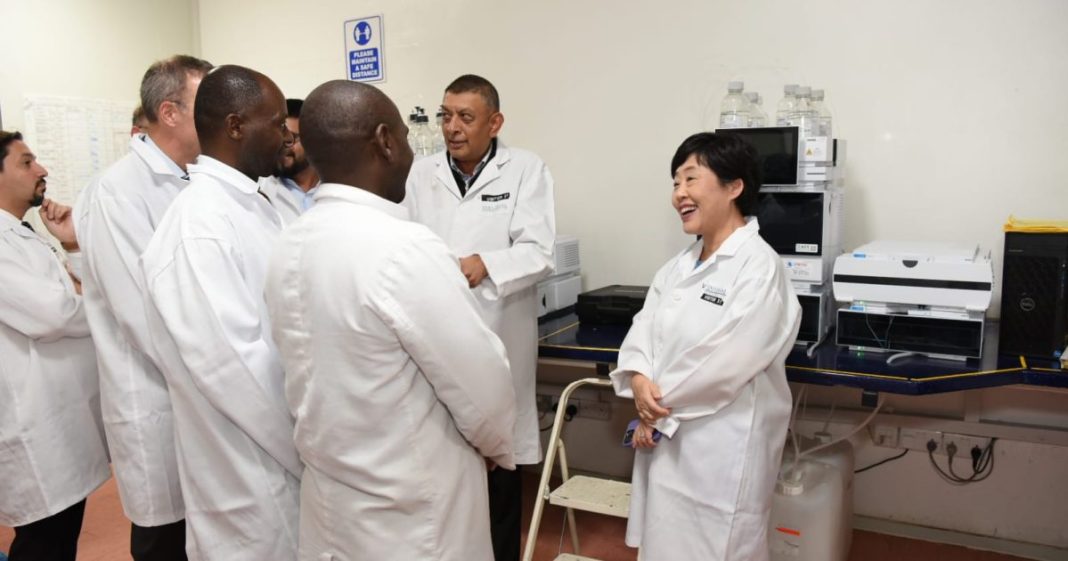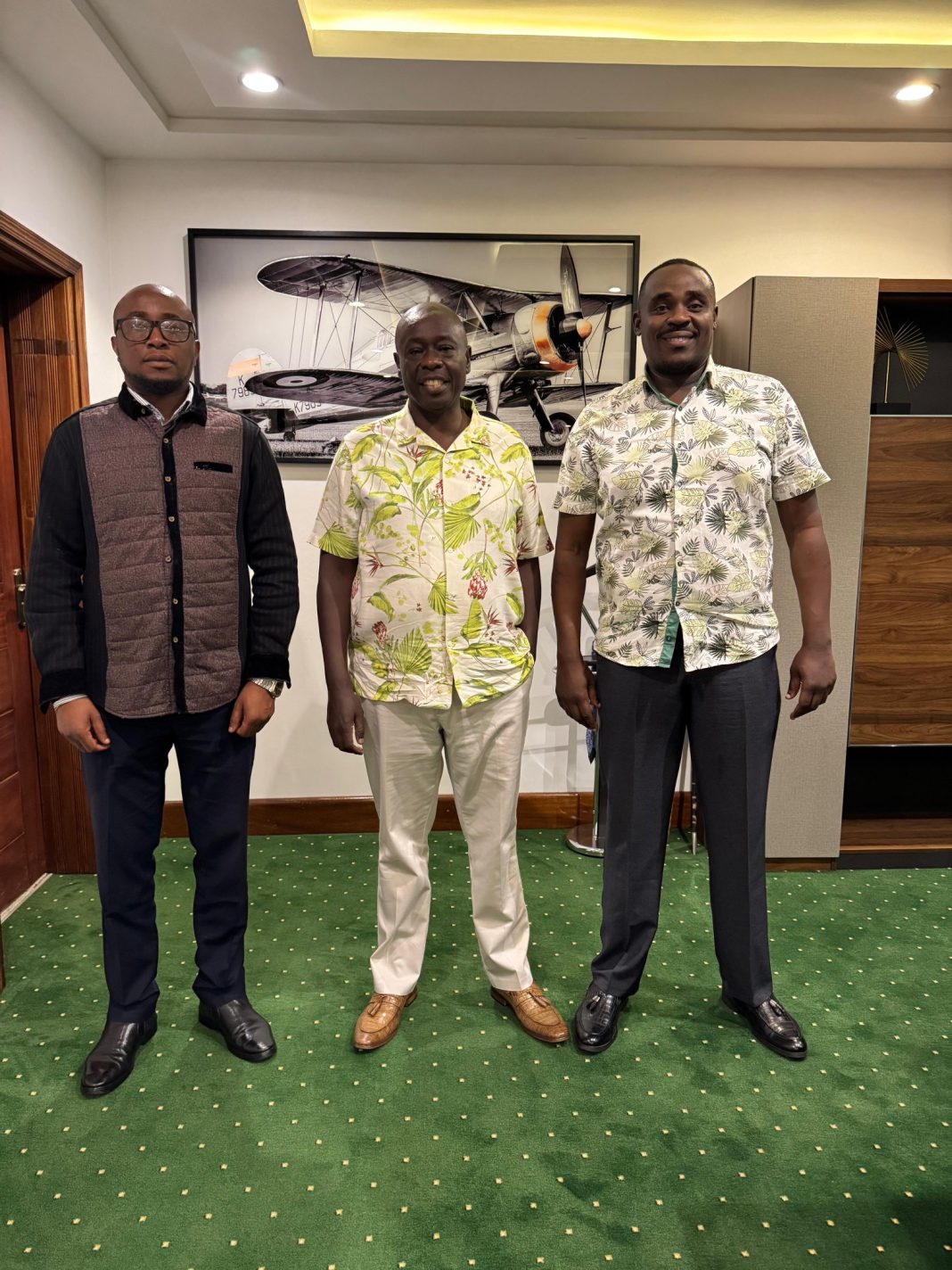A major health breakthrough is on the horizon after Merck, a leading German science and technology company, signed a landmark agreement with Universal Corporation Ltd, a pharmaceutical firm based in Kikuyu, Kiambu County, for the local production of a new pediatric drug to combat bilharzia (schistosomiasis).
The partnership, announced during a Merck delegation’s visit to Kenya between October 27 and 31, marks a pivotal step in advancing Kenya’s capacity to manufacture essential medicines locally. It is backed by the Ministry of Health under the government’s drive to promote self-reliance in pharmaceutical production and strengthen healthcare delivery.
Speaking during the signing event held at Universal Corporation Ltd on October 29, 2025, the Head of the Neglected Tropical Diseases Program at the Ministry of Health, Wycliff Omondi, lauded the collaboration, describing it as “a vital step toward achieving universal health coverage and eliminating neglected diseases.”
“This partnership with Merck and Universal Corporation aligns with our vision to build local capacity, strengthen healthcare systems, and ensure sustainable access to essential medicines,” said Omondi.
Kenya remains among the African countries most affected by schistosomiasis, with over six million people infected and 15 million more at risk, mainly in regions around Lake Victoria and western Kenya. Children in fishing communities bear the heaviest burden, often suffering from stunted growth, anemia, and organ damage caused by the parasitic infection.
The pediatric formulation developed by the Pediatric Praziquantel Consortium, co-founded and led by Merck—targets children under six years, a group not previously included in global mass treatment campaigns.
Universal Corporation CEO Palu Dhanani termed the deal a “transformative milestone” for Kenya’s healthcare and manufacturing sectors, noting that it would create jobs, enhance skills, and position Kenya as a regional hub for medicine production.
“Through technology transfer and capacity building, we are laying the groundwork for sustainable production of life-saving medicines,” said Dhanani.
Merck’s Head of China and International and member of the Healthcare Executive Committee, Hong Chow, underscored the company’s commitment to Africa’s health agenda, saying:
“This collaboration combines global innovation with local expertise. By enabling local manufacturing, we ensure that treatment for bilharzia becomes both sustainable and accessible.”
The German Ambassador to Kenya, Sebastian Groth, commended the initiative, noting that Germany remains committed to strengthening Kenya’s health sector amid declining foreign aid from global partners.
“This partnership delivers both health and economic benefits supporting industrial growth while ensuring vulnerable communities access the medicines they need,” said Groth.
The locally produced bilharzia medicine will play a key role in supporting Kenya’s Universal Health Coverage (UHC) plan and the National Neglected Tropical Diseases Master Plan (2023–2027), which seeks to eliminate schistosomiasis through prevention, treatment, and local production.
As the collaboration takes shape, Kiambu County cements its place at the centre of Kenya’s growing pharmaceutical landscape, marking a significant stride in the country’s journey toward health independence and industrial transformation.







Your style is so unique compared to many other people. Thank you for publishing when you have the opportunity,Guess I will just make this bookmarked.2
us poker sites that accept paypal
References:
classifylistings.com
casino avec paypal
References:
firstcanadajobs.ca
Howdy, i read your blog from time to time and i own a similar one and i was just curious if you get a lot of spam remarks? If so how do you stop it, any plugin or anything you can suggest? I get so much lately it’s driving me mad so any help is very much appreciated.
The straightforward layout makes navigation effortless, catering to both novice and experienced players
alike. Thanks to advanced streaming technology and
mobile optimization, you can enjoy the thrill of the live casino
environment wherever you go, without compromising on quality or performance.
Whether you’re a fan of slots, live dealer games, or classic table games,
you’ll find a diverse selection to choose from. SkyCrown Casino Mobile App
boasts an extensive array of games catering to
every player’s preferences. Zero fees on deposits and withdrawals for Australian players.
Built on a reliable and fully licensed framework,
our platform ensures fair gameplay and total
transparency.
Over the past five months, the platform processed over A$6.1
million in total withdrawals according to figures
displayed on their homepage. The casino opens in its own window separate from your browser, with
a taskbar/dock shortcut for quick access. Tapping it launches the casino in full-screen mode without
Safari’s address bar. Instant games, scratch cards, and crash games round out the selection.
The 7,000+ game library translates fully to mobile.
Many offshore casinos serving Australia offer either browser-only access or APK downloads
that require changing your device security settings.
SkyCrown Casino supports various payment methods including credit/debit cards, e-wallets (PayPal, Skrill,
Neteller), bank transfers, and cryptocurrency options
(Bitcoin, Ethereum). Simply visit our website on your mobile device and follow the download instructions.
Our verification process is designed to be secure yet efficient, maintaining compliance with Australian regulations while providing a seamless user
experience.
References:
https://blackcoin.co/lukki-casino-login-access-your-gaming-adventure/
When setting up your listing, you can add prepaid shipping
labels, making the whole process easier for both you and the buyer.
Upon selling an item, you will receive a payment notification. When creating
a listing on Facebook Marketplace, you can easily add shipping options.
Facebook has evolved from a social media giant to a robust e-commerce platform, offering sellers the capability
to ship items across the country.
Read our how-to guide below on the Facebook marketplace shipping process, including creating a prepaid shipping label, offering various shipping options,
common marketplace mistakes, and more. Testing free or reduced shipping options for items sold in the Marketplace can significantly reduce your shipping expenses.
This crucial step in the process helps ensure that buyers receive their items promptly.
Next, in the shipping process, you’ll want to properly package the items sold on the Facebook Marketplace.
References:
https://blackcoin.co/vip-program-in-uk-casino-advice-and-techniques/
Die Spieler zielen darauf ab, die Schätze der Pharaonen zu
entdecken, indem sie das mysteriöse Buch von Ra finden. Mit hochauflösenden Grafiken und Symbolen wie Skarabäuskäfern, ägyptischen Vasen und dem
Armreif von Anubis bietet Ramses Book ein immersives Spielerlebnis.
Das Casino bietet Hunderte von Slot-Spielen, einschließlich klassischer Drei-Walzen-Slots, Video-Slots und progressive
Jackpot-Slots. Ihr Ziel ist es, allen Spielern, unabhängig von ihrem Standort oder ihren Spielpräferenzen, ein nahtloses
und angenehmes Spielerlebnis zu bieten. Die Mindesteinzahlung beträgt 10€ für
die meisten Zahlungsmethoden, obwohl einige Optionen wie Banküberweisungen 20€ erfordern können. Die
meisten Spieler finden hier Antworten, ohne direkt den Support kontaktieren zu müssen.
Ob Sie an Spielautomaten drehen oder Live-Dealer-Spiele spielen –
Lucky Circus Casino sorgt dafür, dass jede Spielsitzung spannend und sicher ist.
Gelegentlich bieten wir exklusive Kein Einzahlungsbonus-Angebote an.
Dies ist ideal, um neue Spiele auszuprobieren oder Strategien zu testen,
bevor Sie mit echtem Geld spielen. Die Verifizierung erfolgt
schnell und unkompliziert, sodass Sie ohne Verzögerung
spielen und Auszahlungen vornehmen können. Mit der Lucky Circus Casino App können Sie überall und
jederzeit spielen.
Auch problematischem Spielverhalten beugt Lucky Circus vor.
Mit dem Code “WICKED” können sich Kunden, die bereits eine
Einzahlung vorgenommen haben, den Mittwochsbonus sichern.
Für den Echtgeldbonus sind eine Einzahlung ab 20
Euro sowie der Bonus Code “MANIC75” erforderlich.
Die wesentlichen Punkte sind nicht nur im Hauptmenü zu finden, sondern werden zusätzlich am
unteren Rand der Webseite angezeigt. Über das Hauptmenü
erhalten Kunden Zugriff auf die Informationsseiten zum Kundendienst.
References:
https://online-spielhallen.de/ihr-ultimativer-leitfaden-zu-plinko-casino-bonus-codes/